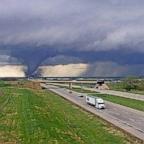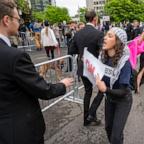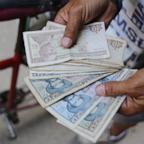Thousands Descend Upon Jena to Protest
Thousands rally in Jena, La. to support six black students.
Sept. 20, 2007 — -- Thousands of protesters have descended on the small town of Jena, La., for a large-scale rally in support of six black students charged in the beating of a white classmate.
They are outraged at what they say is an excessive prosecution of the teens. The district attorney initially had tried to prosecute the students on attempted murder charges.
Martin Luther King III, son of the slain civil rights leader,was there and said the scene was reminiscent of civil rights struggles of the 1960s.
King said punishment of some sort may be in order for the six defendants, but "the justice system isn't applied the same to all crimes and all people."
The Rev. Jesse Jackson spoke, as did Dennis Courtland Hayes, interim president and CEO of the NAACP, who compared the scene in Jena to the controversy that followed racial remarks by radio personality Don Imus.
"People are saying, 'That's enough, and we're not taking it any more,'" Hayes said.
The Rev. Al Sharpton admonished the demonstrators to remain peaceful, and there were no reports of trouble. White residentsin the predominantly white town of 3,000 have largely been reluctant to comment, saying privately that the town was beingunfairly portrayed.
"I believe in people standing up for what's right," 46-year-old resident Ricky Coleman, who is white, told The Associated Press. "What bothers me is this town being labeled racist. I'm not racist."
Roads leading to town were already jammed by early morning with traffic. A rally was held at the courthouse. Later, organizers led protesters on a march to the local high school.
College students boarded buses from as far as Washington, D.C., to voice their anger over what they believe is an injustice in the case known as the Jena Six.
"It always started with young people," said Carey Ash, the Southern University student government president. "It's always started with collegians -- and this is no different."
The parish has declared an official state of emergency and schools and businesses are closed. In fact, police are out from all across the state, as the controversial case drawing so much attention has torn across racial lines in the town and nationwide.
At a morning news conference, President Bush spoke out for the first time about the case. "The events in Louisiana have saddened me," Bushsaid. "I understand the emotions."
He said the FBI is monitoring the situation, adding: "All of usin America want there to be, you know, fairness when it comes tojustice."
And it all started under the branches of a high school tree. The tree is where white students gathered and last September a few black students decided to claim a place, too.
The following day after the black students sat beneath the tree, someone hung three nooses from it.
From there tensions at the school and in the town escalated. And in November, arsonists torched the school.
The anxiety culminated Dec. 4, 2006, when a white student, Justin Barker, was beaten and knocked unconscious by several black students.
Police arrested six black teens, and the prosecutor initially charged them with attempted murder, which was later reduced to battery for all but one of the teens.
MyChal Bell, the only one of the Jena Six to be tried, was convicted of aggravated second-degree battery and faced as much as 15 years in jail. But last week, a state appeals court threw out the conviction, arguing Bell should never have been tried as an adult. He remains in jail, however, unable to make bail while prosecutors prepare an appeal.
Protesters say the attempted murder charges for the unarmed teens were unfair, and that no white students ever faced those kinds of charges after other, similar brawls.
But Wednesday, the prosecutor rejected accusations of bias.
"With all of the focus on the defendants, many people seem to have forgotten there was a victim in this case," said LaSalle Parish district attorney Reed Walters.
Many white residents believe their town has been unfairly trashed by outsiders and the media.
"We're not the most racist town in the world, even though we've been painted out to be," said resident Billie Fowler.
But The Rev. Al Sharpton, who helped organize the march, argued that without the protests, justice would be at risk in Jena and said that critics who accuse him of fanning the flames of racial hatred are incorrect.




